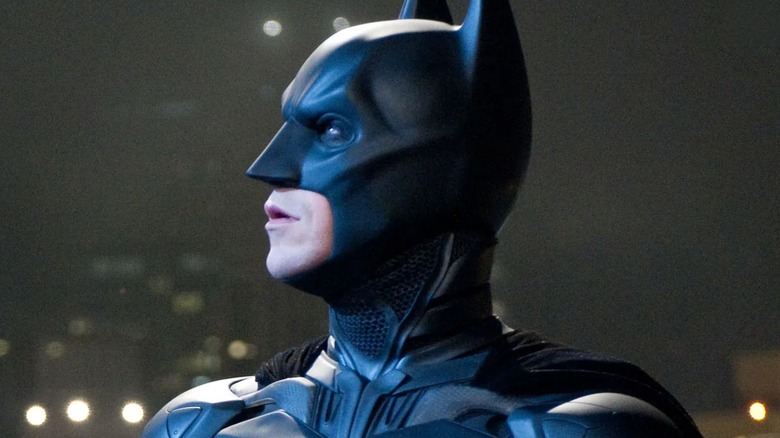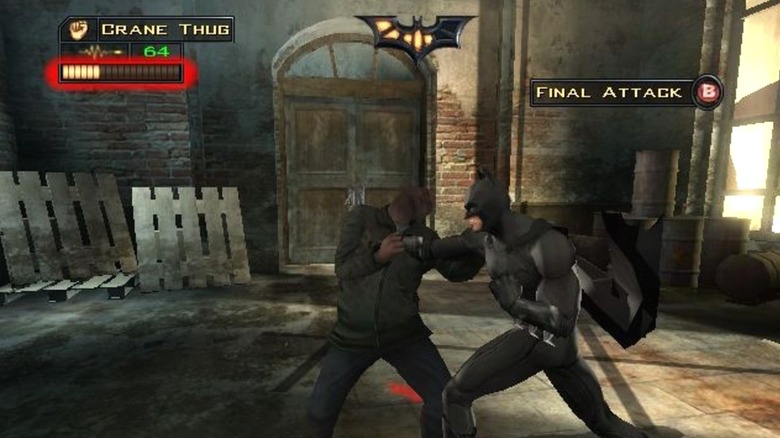A Canceled Batman Video Game Based On The Dark Knight Lost A Studio Millions
The first "Batman" video game ever made was released in 1986. Simply titled "Batman," this isometric action-adventure was lauded for its relative intricacy at the time, and even featured a rudimentary "save game" feature that wasn't the norm during that era. The mythic iconography surrounding Batman as a comic book figure has evolved since then, leading to corresponding game titles with deeper lore and grander settings.
Take 2009's "Batman: Arkham Asylum," which takes the Batman-Joker rivalry to a whole other level while establishing the caped crusader as a stealth-favoring sleuth who excels in vicious combat. Apart from fleshing out Gotham as a treacherous city filled with rogues, "Arkham Asylum" compels Batman to face his fears that stem from a traumatic past. The result is a moody, high-stakes experience that helps imprint every corner of Arkham into your brain forever.
Christopher Nolan's "Batman Begins" got an eponymous video game tie-in back in 2005, which uses a fun mix of stealth and beat-em-up combat to accurately reflect Christian Bale's rendition of the caped crusader. Although the game garnered mixed reviews and moderate success, there were plans to make a tie-in sequel shortly after the release of "The Dark Knight." As it turns out, "The Dark Knight" enjoyed an exorbitant amount of success (earning a worldwide gross of nearly $1 billion), with Heath Ledger's career-defining performance as The Joker cementing its legacy as a unique superhero movie. However, no tie-in game for "The Dark Knight" was ever released, although the film's follow-up, "The Dark Knight Rises," got the game adaptation treatment in 2012.
As the game tie-ins to Nolan's "Batman" trilogy weren't as celebrated as standouts in the genre (like the ambitious "Batman: Arkham Knight"), the non-existence of "The Dark Knight" video game was glossed over. That is, until the YouTube series "Unseen64," — which dissects the death of overlooked video games and other lost media — shared some early-game footage that proves that "The Dark Knight" was in development at some point. What happened here, and why did such a significant title get canceled?
The Dark Knight tie-in game was canceled due to a string of unprecedented problems
Video game developer Pandemic Studios (best known for the exceptional "Star Wars: Battlefront" and "The Saboteur") was tasked with making "The Dark Knight" for Xbox 360 and PlayStation 3, but the project felt doomed from the start. A new, untested game engine named Odin was being used to make it, which kept breaking down the moment developers introduced detailed character models and dynamic lighting to capture Gotham's look and feel. Shifting to another engine and recreating everything from scratch was clearly not an option, prompting the team to haplessly try and fix these fundamental issues that hampered set schedules and deadlines.
After Pandemic wasn't able to meet the film's 2008 release date, Electronic Arts (EA, which acquired the studio and completely changed how things worked internally) set a date that coincided with the film's DVD and Blu-ray release. Unfortunately, the technical issues surrounding base engine function and gameplay kept piling up, and this second deadline was missed too.
A prolonged production process also meant snowballing costs, and by the time EA decided to nix the project, it had already cost them $100 million (via Eurogamer). This, combined with the 2008 financial crisis, led to an unfortunate medley of bad luck and missed opportunities, even though the developers had consistently poured their expertise into a game that was ambitious even in its pre-production era. As for the botched use of Odin, this engine was never suited for an open-world game that demanded quick and seamless gameplay, and its untested status exacerbated the technical issues that kept popping up.
This is a shame, as the game's leaked concept art and early appearance points to a grimy, dread-inducing urban landscape, in which Gotham teems with a mix of old and new architecture that loom ominously over its inhabitants. This could easily have been a coveted entry, as the game already had a solid, operatic story in place, ready to be dramatized into a medium that allows enhanced immersion and artistic freedom. Well, I guess some things are never meant to be.

